
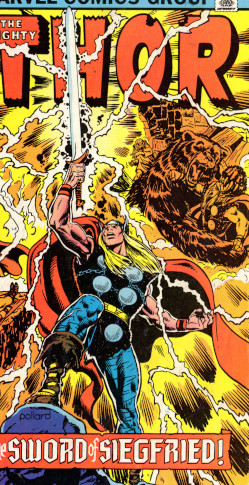

Real Name: Siegfried
Identity/Class: Asgardian god incarnation
Occupation: Warrior
Group Membership: None
Affiliations: Brunnhilde
the Valkyrie, Grane;
formerly Mime;
duped into alliances with Gunther,
Gutruna,
and the Gibichung
clan
Enemies: Alberich,
Fafnir
the Jotun/Dragon, the Gibichung, Gunther,
Hagen,
Mime,
he antagonized the Rhinemaidens
(Flosshilda, Vellgunda, Voglinda)
somewhat by refusing their requests and ignoring their warnings, but
wasn't really their enemy;
he disrespected Wulf/Odin and shattered the shaft of
his spear, Gungnir, but they weren't truly enemies
Known Relatives: Odin (as
Wulf; paternal grandfather), unidentified maternal
grandmother (deceased), Siegmund
(father, deceased), Sieglinda (mother, deceased), unidentified House
of the Volsungs members (kith and kin);
Gutruna (apparent wife); Gunther & Hagen (apparent brothers-in-law); Gibichung clan (apparently more
distant relations by marriage);
extended family via Odin (beyond the scope of this
profile);
Mime (foster father)
Aliases: Siegfried the
Victor;
he was a mortal incarnation of Thor Odinson;
he briefly posed as Gunther and used his name;
Base of Operations: Reincarnated
as Thor Odinson;
formerly an unspecified location in
northern Europe
First Appearance: (Mythological
Sigmund) Völsunga Saga (13th century) or possibly earlier as
Sigurd is used in the Edda and before, dating back to the 11th century;
(Wagner's Siegfried) Siegfried (August 16, 1876);
(Marvel version) Thor I#297 (July, 1980)
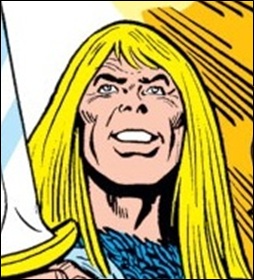
Powers/Abilities: Siegmund had at least enhanced human (if not Class 10) levels of strength, speed, and stamina.
He was charmed by Brunnhilde, such that he was impervious to all harm provided he never turned his back on his foe.
A highly skilled warrior, proficient with a sword, he was brash and fearless. He literally didn't even understand what fear was until he prepared to kiss a beautiful woman.
He was skilled in hunting, at least, with bow and arrow.
He was an experienced equestrian (horseman).
He wielded the sword Needful, which was virtually indestructible, and it possibly enhanced his fighting prowess and/or protected him from injury.
He wore the Tarnhelm, which allowed him to change his form; he was only seen to use it to impersonate another man.
He also wore the Ring of Power / Ring of the Nibelung, which granted vast power, but he was not seen to avail himself of its power.
After being exposed to the blood of the dragon/Jotun Fafnir, he could understand the speech of birds (and apparently speak to them as well).
He sometimes wore a winged helmet, much like Thor's.
Height: Unrevealed; approximately 6'2" (Thor is
6'6")
Weight: Unrevealed; approximately 245 lbs.
Eyes: Blue
Hair: Blond
History:
(Official Handbook of the Marvel Universe Deluxe
Edition#13: Thor entry) - Hoping to retrieve the Ring of Power, forged
from the Rhinegold
from the dragon Fafnir, which Odin could not perform directly due to an
oath, Odin cast Thor into the mortal guise of Siegmund.
(Thor I#296
(fb) - BTS / Thor I#297 (fb) - BTS) - Odin was
forced to aid Hunding in shattering the sword Needful and slaying
Siegmund.
(Thor I#296
(fb) - BTS) - Odin considered
that this was all connected to the curse of the Ring of the Nibelung,
and that he needed a hero never helped by his power like Siegmund
(referring to Siegmund's future son, Siegfried, also an incarnation of
Thor).
(Thor I#297 (fb)) - Brunnhilde gave Sieglinda (pregnant with Siegmund's son) the pieces of Needful, telling her that who ever swung the sword once it was forged anew would be named "Siegfried the Victor" and be even better than his sire. Brunnhilde transported Sieglinda back to Earth.
(Thor I#297 (fb) - BTS) - In labor, Sieglinda was found and cared for by Mime (the brother of Alberich, who had stolen the Rhinegold, and thus precipitated the formation of Siegmund and Siegfried).

(Thor I#297 (fb) - BTS) - Dying in childbirth, Sieglinda told Mime to name the baby Siegfried, and she also gave Mime Siegmund's shattered sword, telling him its name was Needful, that it had been shattered by a god, and that when Siegfried grew up, Mime should give it to him. No mortal would be able to defeat Needful once it had been welded together again.
(Thor I#297 (fb) - BTS) - At some point, Mime resolved to use Siegfried to recover the treasure of the Nibelung from the lair of Fafnir, who had transformed into a dragon.
(Thor I#297 (fb)) - At some point, Odin appeared before Mime, telling him only a man who had never known fear could forge Needful anew.
(Thor I#297 (fb)) - Raised by Mime, Siegfried grew up straight, tall, and strong.
(Thor I#298 (fb) - BTS) - A quarrelsome dwarf (Mime?) told Siegfried he knew what birds were saying in song and that men might find the meaning.
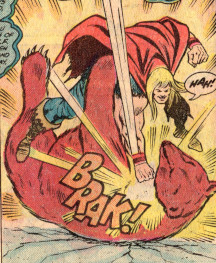
(Thor I#297 (fb) - BTS) - Siegfried repeatedly shattered the swords Mime forged for him.
(Thor I#297 (fb)) - Wrestling an immense bear, Siegfried shattered the wall of his and Mime's hut, surprising Mime as he forged a new sword. Siegfried teased the terrified "old Mime," telling him had brought the bear to see his new sword or to speed Mime along if he was not yet done. Begging Siegfried not to let the bear near him, Mime assured Siegfried the sword was finished, after which Siegfried defeated the bear (stunning it before planning to carry it back to the woods). When Mime asked why Siegfried brought live bears to him, Siegfried told him it was for want of better company than Mime. Ignoring Mime's advice--that he should show more honor to the one who brought him up by hand--Siegfried instead insisted to see the sword.
Though Mime proudly displayed the razor-sharp sword, Siegfried considered its steel untrue after he shattered it by striking its flat against Mime's anvil. Siegfried angrily grabbed Mime and accused him as a bungler planning to use him for some undivined purpose, Mime insisted he loved Siegfried as if he were his own son. To prove this, Mime showed Siegfried the shattered Needful, telling him its origins and that no mere mortal would be able to defeat it when it was welded together again. Siegfried asked Mime to tell him more of his parents, but Mime knew nothing more.
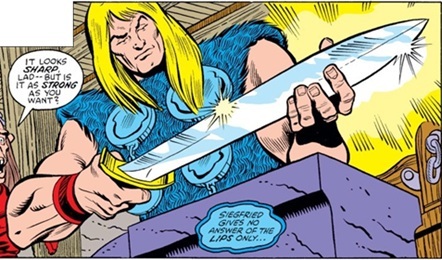
Rather than be appreciative, Siegfried insisted Mime immediately reforge his rightful sword, which he accused Mime of keeping from him all these years. As Mime melted the sword in the forge, he asked why the urgency, and Siegfried told him he had decided to leave Mime's hovel forever.
Needing Siegfried to obtain the Nibelung treasure, Mime nonetheless continued to forge the sword, but when he shattered the sword anew while trying to hammer it into shape, Siegfried angrily announced that Mime could not be trusted to the task, and that he would forge it himself. Though Mime reminded Siegfried that he had never learned swordsmanship, Siegfried said he could not know less than Mime, it seemed, and instructed Mime to stay and advise him.
Recalling Odin's instructions, Mime realized Siegfried had likely never known fear, and he plotted anew. After Siegfried had completed reforging Needful and demonstrating its strength, Mime told Siegfried he had everything he needed to be a warrior, except one thing he had neglected to teach him before: he needed to learn fear, without which he would never be a mighty warrior. Siegfried was eager to learn, and Mime advised him that the dragon Fafnir could teach him if they journeyed to his Hate-Cavern, which was due east of their home.
(Thor I#297 (fb) - BTS / Thor I#298 (fb) - BTS) - Mime prepared food and drink for their journey, including some poisoned wine, prior to their departure.
(Thor I#297
(fb)) - As they approached the cavern,
they glimpsed the fleeing Alberich, who had fled when Fafnir emerged
from his cavern, spewing flames. As Fafnir approached, the terrified Mime
advised Siegfried that he would swiftly learn fear by looking into
Fafnir's eyes.
Fafnir agreed that he would teach Siegfried Mime's
lesson, but that Siegfried would not live long enough to profit from it.
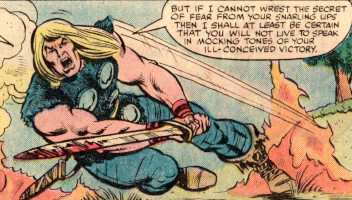
(Thor I#298 (fb)) - A terrified Mime blurted out that the dragon's heart was in the same place as in any other beast before fleeing to seek shelter. As Siegfried knelt to pay homage to Needful, a bird alighted upon Siegfried's shoulder and sang fervently. Recalling a notation that men could learn what birds were singing, Siegfried felt certain the bird was trying to tell him something; and Fafnir told him that it sang his death-song, his reward for looking in his Hate-Cavern lair. As he struck Siegfried with his tail, Fafnir assured him he would not keep that reward from him much longer. Fafnir wrapped his tail around Siegfried's waist, but Siegfried slashed the tail with Needful, noting he sought not death, but another prize to make his victory ever sweet.
Flinging Siegfried away and recalling Mime's discussion of learning fear, Fafnir prepared to teach Siegfried and unleashed his fiery breath. Protected by his shield, Siegfried denied the taunting dragon that he had learned anything of fear, and as he sliced into Fafnir's foot, he insisted the dragon teach him or he would cleave his scaly flesh from his bones. Kicking Siegfried away, Fafnir asked why he wanted something that diminished his stature, but -- dodging Fafnir's breath and sinking his sword into the dragon's nose -- Siegfried explained how Mime had told him fear was the only attribute he needed to become the mightiest warrior of all.
Having instead felt joy upon Fafnir's approach, because battle was what he was born for, Siegfried mocked the dragon as he took to the air for trying to flee before teaching the lesson. Siegfried then slashed Fafnir's head and stabbed his right eye with Needful, causing Fafnir to furiously throw Siegfried from his head. Falling into the trees below, Siegfried groaned, but wished that all who opposed him did so with Fafnir's ferocity.
Smashing through the trees, Fafnir asked if the vision of his dripping sightless eye at last filled him with fear. Feeling only anger for being taunted about not being able to receive his final lesson, Siegfried instead vowed that Fafnir would not live to further taunt him. Siegfried then leapt up and shoved Needful into Fafnir's chest, mortally wounding the dragon.
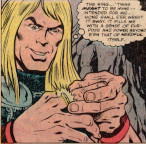
Fafnir reverted to his giant form as he collapsed to the ground, asking if Siegfried would grant him one last request, to know Siegfried's true nature. Not knowing his origins, Siegfried instead noted how Fafnir's blood had spattered into his mouth and seemed to awaken new perceptions in him, as if he would soon come to understand things which of late had confounded him.
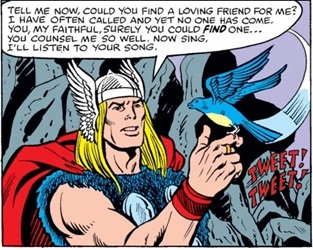
Dying, Fafnir told Siegfried of the Rhinegold and his golden hoard, which was now Siegfried's, though treason followed he who held it..."and the one who plotted for you this terrible deed...shapes you for death..."
Having heard Fafnir mention a ring, Siegfried pulled the glowing Circlet of Power from Fafnir's giant finger, and the ring then shrunk to a size to fit his hand, allowing Siegfried to don it. Its shrinking made Siegfried certain that the ring -- whose power he sensed was even greater than Needful's -- was made for him, and he swiftly resolved that none should ever wrest it away.
Siegfried then entered the Hate-Cavern, oblivious to Mime's having observed his slaying of Fafnir and of his plot to kill him and claim the ring and the treasure of the Nibelung. Within the cave, Siegfried was impressed with the massive mound of gold, and he claimed a new war cloak to replace the one he had lost in battle with Fafnir. Siegfried also donned the magic helmet Tarnhelm.
The awareness gained from Fafnir's
blood allowed Siegfried to now understand the bird that spoke to him,
and it warned him of Mime's treachery. After Mime
delivered Siegfried's helmet (dropped in the battle with Fafnir), the
warrior placed it atop the Tarnhelm, and the two apparently (and without
any ado) merged, retaining the classic winged helmet of Thor. Mime was surprised to learn Siegfried had still not learned
fear, but Siegfried noted that far more wicked rogues remained alive and
unpunished.
When Mime offered Siegfried to quench his thirst with
his secretly-poisoned wine, the warrior recognized the treachery and
hurled Mime away; landing in Fafnir's blood, Mime was poisoned by it and
died in agony. Siegfried then cast Mime into the Hate-Cavern and
then pushed Fafnir's corpse in front of the mouth of the cavern, making
him eternal guardian of his favored hoard.
When the bird returned, Siegfried spoke to it, relating its past and hoping it could tell him how to find a lover. He understood its song as telling of the beautiful "Brunnhilda" (Brunnhilde) who slept surrounded by fire, high on a mountain rock, and that only one lacking in fear could awaken her and win her hand; he looked forward to Brunnhilde teaching him fear.
Soon, Siegfried came to the mountain, at the base of which waited Odin in his Wulf aspect. Explaining that it was he who had placed Brunnhilde there (which he done as punishment for having previously aided Siegmund against his wishes) and that it was his spear (Gungnir) that had previously shattered Needful. Wulf warned Siegfried of the dangers and refused to allow Siegfried past unless he defeated him. Heedless and defiant (and ignorant of Wulf's name and nature as his "grandfather" or true nature as Odin), Siegfried insisted the old man move and shattered the staff of Wulf's spear; with Siegfried having proven his courage and power, Wulf departed, announcing that he could not prevent him.
Siegfried then scaled the steep, rocky mountain to the circle of flame. Despite the great heat, Siegfried continued into and through the flames, feeling pain but not fear, and using his new war cloak to shield him from the scorching furnace. Though his sweat made his grip slippery, he continued all the way to the top, at which point his pain and fatigue swiftly faded.
Seeing the sleeping Brunnhilde, Siegfried at last knew fear as he reached to kiss her, but he continued nonetheless. Waking and noting the handsome stranger, Brunnhilde swiftly recalled her previous Valkyrie nature and rebelled violently, but Siegfried reminded her how he had rescued her from her endless sleep and sought only her love. Recalling that Odin had stripped her of her godhood and of the nature of the man who would free her, and with whom she would fall in love when Siegfried expressed his love for her, Brunnhilde fell in love with him as well. She accepted finding Siegfried as more than making up for her loss of godhood, and he noted that finding her had made him the warrior he was destined to be.
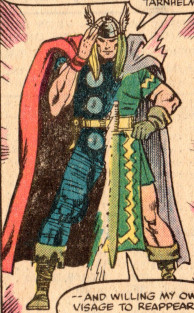
(Thor I#298 (fb) - BTS) - Siegfried and Brunnhilde's love was consummated, as Odin had intended.
(Thor I#299 (fb)) - Feeling Siegfried's destiny was to save the world, Brunnhilde bade him leave her in the circle of flame and to go fulfill his destiny; before he departed, she mystically enchanted him so that he would be invulnerable except to attacks to his turned back, and Siegfried gave Brunnhilde the Ring of the Nibelung to wear as a symbol of their undying love. She also instructed him how to claim her once-winged steed Grane as his own.
Siegfried rode Grane for a day until reaching the River Rhine, and then taking a boat miles downstream to the stronghold of the Gibichung Clan
(Thor I#299 (fb) - BTS)- The dwarf Hagen convinced the Gibichung's Lord Gunther and his younger sister, Gutruna, that they should marry mates worthy of their station to spread their fame/line: Brunnhilde and Siegfried. To facilitate this, Hagen revealed to them a potion whose merest sip would make a man forget those he has loved and enslave him to the first woman he would behold after supping.
(Thor I#299 (fb)) - Seeking adventures and a repast, Siegfried stopped at Gunther's castle and offloaded with Grane. Though guards barred his trespass verbally and physically, Siegfried easily overwhelmed the lot of them (at least 5), mocking their lack of hospitality, at which point Hagen appeared, telling him the guards had only been instructed to tes thim to prove him to be the true Siegfried, of whose heroism "the very Rhine sang."
Hagen then brought Siegfried before Gunther, who apologized for the testing and offered Siegfried anything in his kingdom. Siegfried noted that he craved only adventure, having discarded the plunder of the Nibelung clan, save for the Tarnhelm and the ring, the latter of which he had given away. Praising Siegfried's selflessness, Gunther arranged a toast to Siegfried's exploits before seeking to devise another, leading Siegfried to drink the potion-tainted wine; though Siegfried began to toast Brunnhilde, he forgot her name as soon as he tasted the wine, after which he gazed upon and fell passionately in love with Gutruna.
Siegfried rushed forward and became acquainted with Gutruna, praising her beauty and querying whether she was spoken for; noting that she was not, she further stated that it would be unseemly for her to marry before her brother did. Gunther then explained that the woman he would wed was a prisoner in a mountain of fire, and this only had the faintest familiar ring to Siegfried, who promised to recover the woman for Gunther if he may marry Gutruna; Gunther agreed and the two swore a blood oath.
After Hagen told Siegfried that the Tarnhelm could alter his appearance, Siegfried departed, while Hagen plotted to have Gunther slay Siegfried, enabling Hagen to claim the Ring of the Nibelung.
(Thor I#299 (fb)) - Reaching and scaling the mountain atop which Brunnhilde was held, Siegfried used the Tarnhelm to take Gunther's form before passing through the circle of fire. As "Gunther," he announced his intention to claim Brunnhilde's hand in marriage, ignoring her argument that she was already spoken for and taking back the Ring of the Nibelung by force. Noting that only he who had placed the ring upon her finger could remove it, Brunnhilde asked what type of demon he was, but "Gunther"explained that he was merely a man of might; as he picked her up, Brunnhilde swooned (fainted). Feeling something familiar about Brunnhilde and the whole situation, Siegfried nonetheless held to his blood oath to Gunther and headed back down the mountain.
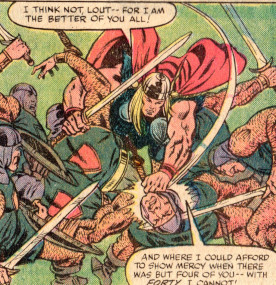
Soon after, Hagen greeted Siegfried (still in Gunther's form) as he returned to the Gibichung castle, after which he delivered the still unconscious Brunnhilde to Gunther and then transformed back to his own appearance at Gunther's request. Siegfried briefly partook of Gutruna's beauty before she departed to prepare for their nuptials.
That evening, the entire Gibichung clan enjoyed the wedding banquet, after which the dual wedding commenced. However, as Brunnhilde regained her wits, she recognized Siegfried, reminding him of their eternal vow. At the mercy of Hagen's potion, Siegfried did not recall this, and he denounced Brunnhilde's claims, but Brunnhilde loudly insisted Siegfried had indeed pledged his love to her and shared with her "his manly company" for a night. As Siegfried continued his denials and vowed by their oath, Hagen pointed out that Siegfried held the ring that Brunnhilde had worn (claiming it to have been a symbol of her maidenhood). After Brunnhilde explained that "Gunther" had taken the ring from her, Gunther reasoned that Siegfried had had his way with her while disguised as Gunther the previous night.
Furious at this seeming betrayal and that his wife was not a virgin, Gunther tried to salvage some of his dignity by ordering his guards to slay Siegfried. Though insisting on his innocence, Siegfried nonetheless swiftly overpowered Gunther's guards; when they noted that they would repay him for the drubbing he had given them the previous morning, Siegfried assured them he was their superior and "where I could afford to show mercy when there was but four of you -- with forty I cannot."
As Siegfried proceeded to route all of his opponents, Gutruna begged Hagen to stop the carnage; and when Gunther noted that Siegfried must be charmed, a tearful Brunnhilde -- distraught by Siegfried's apparent betrayal -- unwittingly admitted that he was indeed charmed, impervious to all harm provided he never turned his back on his foe. As Siegfried continued to proclaim his innocence, Gutruna asked Gunther to call off his men, noting they could not defeat Siegfried. Realizing he was risking losing all of his men, Gunther ordered them to halt, and he proposed a truce, acknowledging that while he still needed to know the truth about Siegfried and Brunnhilde, he wished peace so Gutruna could marry him: Gunther would allow this as long as Siegfried took Gutruna, married her, and left his kingdom. Confirming that Gutruna was his sole interest, Siegfried accepted these terms.
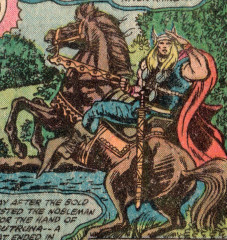
As Siegfried departed and Brunnhilde railed at having lost him forever, Gunther remained suspicious of a past relationship. Hagen assured Gunther he could make Brunnhilde his with a sip of his potion, and that he now knew how to kill Siegfried.
(Thor I#300 (fb) - BTS) - Siegfried and Gutruna were apparently married.
(Thor I#300 (fb) - BTS) - The next day, Siegfried unsuccessfully sought game to take to Gutruna.
Gunther decided to make amends with Siegfried for his sister's sake, and he told Hagen he no longer wanted to kill Siegfried.
(Thor I#300 (fb)) - As Siegfried rode along the river Rhine, the Rhinemaidens confronted him, offering to tell him where game hid if he would give them his ring. When he refused, considering it too precious, they warned him that doom would befall anyone who wore the accursed ring, and that only the Rhine's waters could cancel the curse. Noting his power and lack of fear, Siegfried mocked the curse, and the Rhinemaidens departed, telling him that he was doomed.
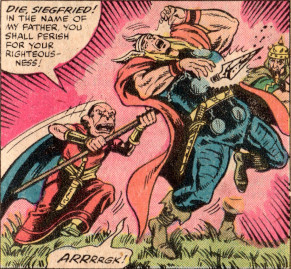
As Siegfried considered the similar curse voiced by Fafnir, he was approached by Hagen and Gunther, who noted that he had come to make amends, as it was unseemly to be an enemy to his sister's future husband. Gunther further noted that he had come to accept that it was all a misunderstanding and that he now knew Siegfried had done nothing to break his oath to him, after which Siegfried accepted Hagen's offer to dine with them on the bird they had caught.
Gunther comforted Siegfried on his unsuccessful hunt, and Hagen gave him some ale to quench his frustrated thirst. However, Hagen considered that while Gunther had gone back on their plan to to slay Siegfried, he had not, as he must regain his father's Rhinegold ring.
When Gunther and Siegfried observed two cawing ravens, and Siegfried noted how he once understood bird's languages but no longer, Hagen took advantage of their distraction: Recalling Brunnhilde's unwittingly revealing Siegfried's vulnerability to attacks from behind, Hagen rushed forward and shoved his spear through Siegfried's back.
Siegfried turned, snapping the spear's shaft and accepting that the ring was indeed cursed before lunging at Hagen, but he died and collapsed before reaching Hagen.
Gunther chastised Hagen, asking if it was not enough that they had tricked Siegfried into giving up his true love Brunnhilde to him. Gunther bade Siegfried farewell, telling him that though he had died ignobly, he promised Siegfried a Viking's funeral. Gunther then lifted Siegfried's body atop his steed and led him back to the castle, where he told Gutruna that Hagen was his killer. However, as Gunther drew his sword, Hagen swiftly pulled his dagger and hurled it into Gunther's chest, killing him.
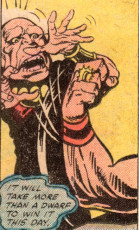
Lamenting the loss of a husband and a brother in the same day, Gutruna then ordered the guards to seize Hagen, and Hagen attempted to claim the Rhinegold ring, bragging that he would soon have all others in his power, but Siegfried's lifeless fist suddenly clenched the ring defiantly, preventing Hagen from getting it.
Brunnhilde then entered, learned of her lover's death, and blamed his being stabbed in the back on herself for revealing his weakness; though she felt that their love was meant to endure, she resolved there was nothing to do but have him taken aboard great oaken logs to the river Rhine and set on fire, after which she and her steed leapt into the fire as well.
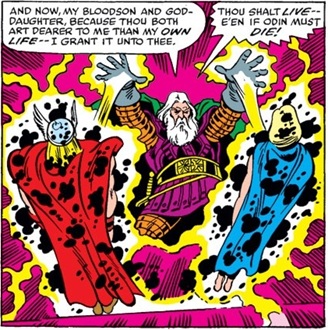
When the Valkyries Valtrauta and Grimgerda brought Siegfried and Brunnhilde's forms to Asgard, Odin restored them to their true godly forms as Thor and Brunnhilde the Valkyrie before dismissing them and erasing their memory of those events. Odin then claimed the Ring of Power, accepting its curse for himself.
Comments: The original concept of Siegfried was created by unknown
Icelandic parties;
the Ring of the Nibelung
character was created by Richard Wagner;
the Marvel character was an adaptation of Wagner's
character, adapted by Roy Thomas, Keith Pollard,
and Chic Stone.
For this
and all profiles related to the Ring of the Nibelung, you should
open up another page in your browser and load Wagner's "Ride of
the Valkyrie"
Yes, this is Elmer Fudd's "Kill the Wabbit"
song...
This profile refers to the Thor incarnation only, and not to Thor himself; see Thor's Official Handbook of the Marvel Universe profile for further information on Thor.
Siegfried and
Götterdämmerung
Siegmund was based on the character from Richard Wagner's Siegfried and Götterdämmerung (the German translation of the Norse Ragnarok/Twilight of the Gods), the third and fourth of four parts in his "Der Ring Des Nibelung" (The Ring of the Nibelung) opera. You can Google it for more information.
Per Wikipedia:
Further:
Sigurd (Old Norse:
Sigurðr) or Siegfried (Middle High German: Sîvrit) is a legendary hero of
Germanic mythology, who killed a dragon and was later murdered. It is possible
he was inspired by one or more figures from the Frankish Merovingian dynasty,
with Sigebert I being the most popular contender. Older scholarship sometimes
connected him with Arminius, victor of the Battle of the Teutoburg Forest. He
may also have a purely mythological origin. Sigurd's story is first attested on
a series of carvings, including runestones from Sweden and stone crosses the
British Isles, dating from the eleventh century.
In both the Norse and
continental Germanic tradition, Sigurd is portrayed as dying as the result of a
quarrel between his wife (Gudrun/Kriemhild) and another woman, Brunhild, whom
he has tricked into marrying the Burgundian king Gunnar/Gunther. His slaying of
a dragon and possession of the hoard of the Nibelungen is also common to both
traditions. In other respects, however, the two traditions appear to diverge.
The most important works to feature Sigurd are the Nibelungenlied, the Völsunga
saga, and the Poetic Edda. He also appears in numerous other works from both
Germany and Scandinavia, including a series of medieval and early modern
Scandinavian ballads.
Richard Wagner used
the legends about Sigurd/Siegfried in his operas Siegfried and Götterdämmerung.
Wagner relied heavily on the Norse tradition in creating his version of
Siegfried. His depiction of the hero has influenced many subsequent depictions.
Another notable difference in the Volsunga saga is that the offspring of Sigmund and Signy was the powerful Sinflotji, while Sigmund's later wife, Hjordis, was the mother of Sigurd. After Sigmund had been mortally wounded by a suitor Hjordis had rejected, Sigmund gave the fragments of his sword to Hjordis so that they might one day be reforged for their yet unborn son (Sigurd). Wagner's Sieglinde combined aspects of both Signy and Hjordis.
These stories were among those told to Thor by the Eye of Odin, and the events therein, particularly the origins of the current Odin incarnation, have been called into question.
New images by Ron Fredricks.
Profile by Snood.
CLARIFICATIONS:
Siegfried should be distinguished from:
images: (without ads)
Thor I#297, cover (main image - Siegfried holding Needful)
Thor I#297, p14, pan2 (headshot - Siegfried)
Thor I#297, p8, pan6 (young Siegfried on Mime's shoulders)
Thor I#297, p10, pan4 (Siegfried punching bear)
Thor I#297, p13, pan6 (Siegfried reforging Needful)
Thor I#298, p8, pan1 (Siegfried holding Needful, charging Fafnir)
Thor I#298, p10, pan1 (Siegfried putting Ring of Nibelung on his finger)
Thor I#298, p13, pan1 (Siegfried speaking with bird)
Thor I#299, p11, pan3 (Siegfried using Tarnhelm to transform into Gunther)
Thor I#299, p14, pan5 (Siegfried battling many Gibichung warriors)
Thor I#300, p2, pan1 (Siegfried on horseback by Rhine river; Eye of Odin [upper left])
Thor I#300, p3, pan5 (Siegfried killed by Hagen)
Thor I#300, p4, pan8 (Siegfried's corpse defiantly clenching Ring)
Thor I#300, p6, pan8 (Siegfried gets reincarnated as Thor; Odin [background], Brunnhile [left])
Appearances:
Thor I#296 (June, 1980) - Roy Thomas (writer/editor), Keith Pollard (penciler), Chic Stone (inker), Jim Shooter (consulting editor)
Thor I#297 (July, 1980) - Roy Thomas (writer/editor), Keith Pollard (penciler), Chic Stone (inker), Mark Gruenwald (assistant editor)
Thor I#298 (August, 1980) - Ralph Macchio (writer), Keith Pollard (penciler), Chic Stone (inker), Jim Salicrup (editor)
Thor I#299 (September, 1980) - Mark Gruenwald (writer), Keith Pollard (penciler), Chic Stone (inker), Jim Salicrup (editor)
Thor I#300 (October, 1980) - Mark Gruenwald & Ralph Macchio (writers), Keith Pollard (penciler), Chic Stone (inker), Jim Salicrup (editor)
First posted: 08/12/2018
Last updated: 10/01/2025
Any Additions/Corrections? please let me know.
Non-Marvel
Copyright info
All other characters mentioned or pictured are ™ and © 1941-2099
Marvel Characters, Inc. All Rights Reserved. If you like this stuff, you
should check out the real thing!
Please visit The Marvel Official Site at: http://www.marvel.com
Special Thanks to www.g-mart.com for hosting the Appendix, Master List, etc.!